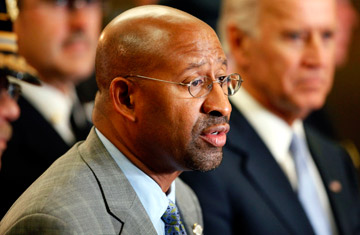
Mayor Michael Nutter of Philadelphia speaks after a roundtable discussion about the impact of budget cuts on the police force as Vice President Joe Biden, right, listens, Oct. 18, 2011, in Philadelphia.
(2 of 3)
The Pragmatic Caucus has no formal manifesto or K Street address for lobbying activities. But a unifying philosophy can be discerned by what they are doing and how they are doing it.
Two things stand out.
First, the Pragmatic Caucus is focused on embracing a new economic growth model. The Caucus is not about recreating yesterday's economies, but about building new ones that will be more resilient in providing jobs and in anticipating and meeting future needs. The blueprint calls for the U.S. to export more and waste less, to innovate in sectors that matter, to manufacture and deploy more of what we invent and, in short, to build an economy that actually works for working families.
Across the country, the Pragmatic Caucus is engaged in economic renewal.
While it took four years for Washington to finally pass a series of free trade agreements, metros such as Los Angeles, Minneapolis/St. Paul, Portland and Syracuse are reorienting their economic development strategies towards exports, foreign direct investment and skilled immigration.
While federal transport programs are in limbo, metros like Miami and Chicago, and states like Michigan, are restructuring and modernizing their air, rail and sea freight hubs to position themselves for an economy where growth is increasingly driven by global rather than just domestic demand.
While federal energy policy is in disarray, cities such as San Diego are building out their electric vehicle infrastructure, Seattle and Philadelphia are cementing niches in energy efficient technologies and the state of Connecticut is experimenting with Green Banks to help deploy clean technologies at scale.
What unites these disparate efforts is intentionality and purpose. After decades of pursuing fanciful illusions (becoming the next Silicon Valley) or engaging in copycat strategies, states and metros are deliberately and systematically analyzing, and then building, on their special assets, attributes and advantages using business planning techniques honed in the private sector.
Second, the Caucus has a distinct modus operandi. As Colorado Governor John Hickenlooper likes to say "collaboration is the new competition." Neighboring cities and metros, long divided by petty differences, are now coming together to engage forcibly in the global market. For example, Louisville and Lexington, Kentucky, once on opposite sides of a decades old college basketball rivalry, are now constructing a common platform for advanced manufacturing. In Northeast Ohio, the Fund for Our Economic Future, a non-profit intermediary, is leading a similar effort to retool and modernize small and medium sized manufacturing firms located across Akron, Canton, Cleveland and Youngstown.
The Pragmatic Caucus does not, of course, exist in all states and metropolitan communities. Many metros continue to be defined by division rather than unity. And, as Wisconsin's battles with its labor unions showed earlier this year, partisanship hasn't been repealed in states. But the dominant, driving trend at the state and local level is toward collaborative governance and no-nonsense results.
